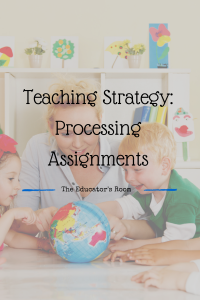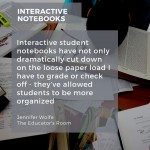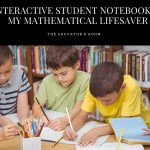 One of the greatest resources I’ve ever used in the classroom is the Processing Assignment (or PA). Created by the Teachers’ Curriculum Institute (TCI), the PA is really whatever you or the students want it to be. Let’s examine more on the incredible teaching tool.
One of the greatest resources I’ve ever used in the classroom is the Processing Assignment (or PA). Created by the Teachers’ Curriculum Institute (TCI), the PA is really whatever you or the students want it to be. Let’s examine more on the incredible teaching tool.
What is a Processing Assignment (PA)?
Simply put, it’s hitting the “pause button,” assessing and accumulating the current knowledge, and recreating what one learned in a creative, fun, and intellectual manner.
Just for clarification, a Processing Assignment is designed and created by the student. The PA’s produced by my students have won countless awards and national commendations, redefining what it means to process information!
Why should I use this tool in his classroom?
1.Students’ reading & writing development increases: There is concrete evidence tying the use of PA’s to increasing student scores
2.Note-taking becomes an active process: Instead of being drones of learning, students are put in control
3.Notebooks filled with PA’s become a portfolio of individual learning: I can’t tell you how many times former students ask me “What are you learning in class?” – and when I tell them, they remember exactly what Processing Assignment they created for that exact lesson. Ten years ago. That is powerful learning.
4.Students personally tailor their education to the way they learn: Teachers don’t tell students what to do for any processing assignments – the ideas and production are all their own, and they’re very proud of them
5.Processing Assignments are a creative outlet: You will not hear too many students say they’re “bored” in this class, because the PA puts them in control
Why do students need to learn to be more creative?
History teaches us that creativity and innovation improves our lives and revolutionizes the world. Some examples of people who creatively solved problems with outside-the-box thinking include the following (which we’ll study in Early American):
The United States Postal Service
The Declaration of Independence
The carbine rifle and modern bullet
The Constitution of the United States of American and the modern republic
The opening of the Erie Canal
The invention of the spinning jenny
The invention of the cotton gin
The railroad
Abolition of slavery
Compulsory education
Among others.
I do not profess to believe that each student in my classes will make the next great innovation that saves the world time, money, and morality, but I certainly know I give them a better chance at improving the world when they’re creative with the information given to them rather than mindlessly memorizing it.
Your students might not remember Eli Whitney’s name (he’s the inventor of the cotton gin) or memorize James Madison’s compromises for the Constitution, but they will be inspired by it. Who knows what students will do with their own creative ideas? That’s a rhetorical question I want them to answer.
What types of Processing Assignments are there?
You can copy and print the list below or use this link to see examples of it in my classroom. Enjoy!
3D – making your learning 3-dimensional… and if it’s too large, don’t be afraid to take a photo of it!
Acrostic – write the term vertically and then turn each letter into sentences horizontally.
Advertisement – create a flyer, billboard, or pamphlet promoting something.
Balance – show how things are tethered to one another by using a balance beam or scale.
Caricature – turn the person into a cartoon and describe different portions of what they look like, how they dress, and things about them.
Cartoon – create a cartoon panel displaying what you learned that day.
Cause & Effect – every action has consequences; use this PA to show just that.
CD Cover – make a CD of songs that say a lot about the person; design a front cover and a back to include a few songs that he/she might like.
Commemorative Stamp – some events and people have been honored by their respective postal offices. Here you can do the same.
Cultural Reference – tie something in society into the PA.
Cycle – what goes around comes around.
Definitive Wheel – use a spiraled wheel to describe an event, person, or vocabulary term.
Dress-up – Dress up yourself, your friends, or a doll you’ve made!
Edible – learning time = snack time!
Eulogy – write a poem or speech dedicated to the death of something / someone.
Fakebook Profile – give a character life by creating a Fakebook page with contact info, activities, favorites, education, etc.
Finger Puppets – great ideas are sometimes right at your fingertips!
Flow Chart – connect ideas to one another by using arrows for continuation.
Foldable – flip up and find something we’ve learned.
Football Game – sometimes two opposing sides can be compared in a battle on the gridiron
Historical Markers – create a tribute to a person or place by explaining its historical significance and designing a monument / plaque in its name.
Illustrated Definition – bring a term to life by adding some pictures to the definition.
Journal – place yourself in the time and create a journal entry talking about some of the things you learned that day in context.
Legos – because, sometimes, having fun and learning are the same thing
Metaphor – take a social studies concept and turn it into a metaphor.
Mind Notes – place a person or idea on a paper and give it life by expressing its or his/her thoughts on paper.
Minecraft – your favorite game does have a use in school after all; build a world and take photos of it, or capture a video of you traveling it!
Montage – use a group of pictures to give a term meaning.
Movie poster – turn your topic into something worth watching
Music – sometimes history sounds better with a beat
Numerical Representation – numbers don’t lie, especially when it comes to facts; show how they reflect what was learned.
Package – a PA can be placed in its own case, opening up to reveal its contents.
Petition – have something to say? Get the support of your peers by relating it to the concept
Pictoword – give a term more depth by adding to the letters.
Play on Words – sometimes we can have a weigh with what weaved learned.
Poetry – turn what you learned into lessons you won’t burn.
Point of View – write a term in the middle and then react to it from two different sides.
Post Cards – imagine sending a post card about an event or person – what you would you say?
Prop – add a little something extra by adding something I can use as an extra in a play!
Proverbs – use popular proverbial phrases such as “don’t bite the hands that feeds you” or “better to teach a man to fish than to feed him for one day” to relate to a historical concept (very difficult!)
Pull Through – a 3D representation that has a pull-through writing/picture piece to reveal the content.
Recopy Notes – you’d be surprise that just recopying your notes in a creative way can help the information reprocess itself.
Report Card – create a report card for a person grading them on things they’ve accomplished or failed to accomplish.
Shopping List / To-Do List – imagine you’re a character or term and make a list of items – either real or fake – that they might need to purchase on their “trip.”
T-Chart
T-Shirts – wear your Processing Assignment all day (or at least in class)!
Time Line – give dates chronological order and pictures.
Topical Net – connect terms to one another.
Tri-fold – not all PA’s need to fit into your notebook; some can showcase your presentation prowess.
Twitter Post – assume the role of a historical figure / term and make a fake tweet; just stay under 140 characters!
Vanity Plates – draw a historical term / figure in a character, and give them vanity plates for their home state / country (keep in mind all plates are between 2 – 7 characters).
Venn Diagram
Visualization Representation – use pictures like hieroglyphics to tell about a term.
Weekly Calendar – make a mock calendar for what a week would be like for a historical figure / term we’re studying.
Word Splash – put your word in the middle and then use other words to describe it.
Wordle – go to Wordle.com or Tagxedo.com and input a bunch of words, and then turn them into a picture
Yes/No Chart – ask a series of “yes/no” questions in order to arrive to your learning.





